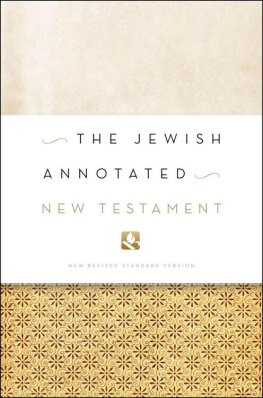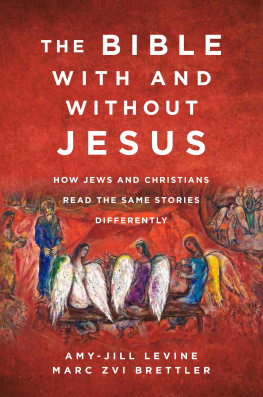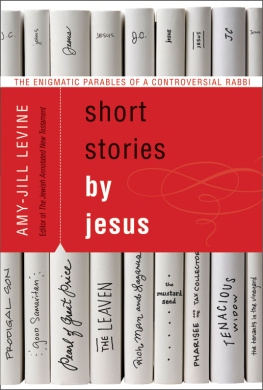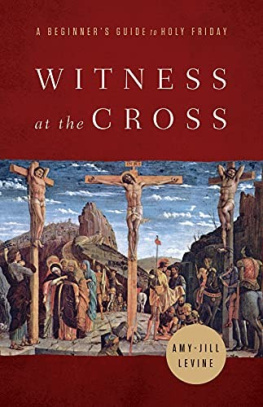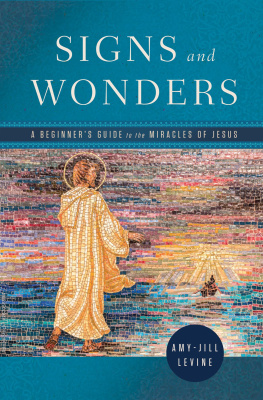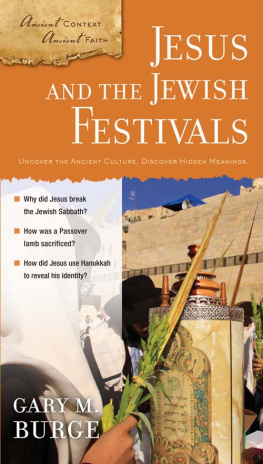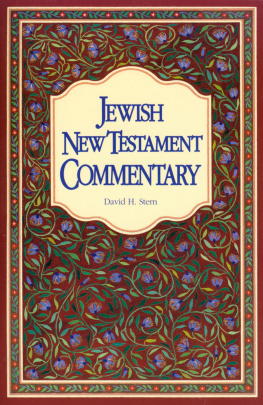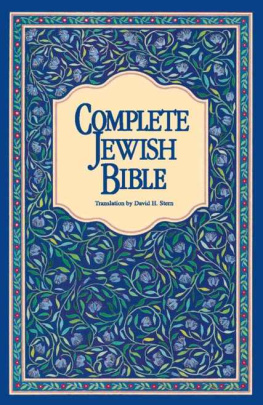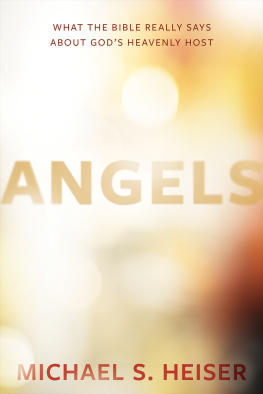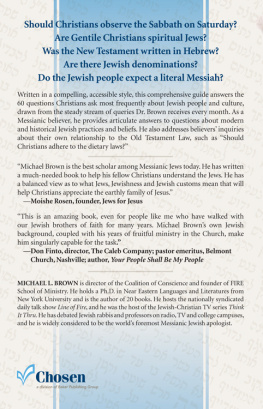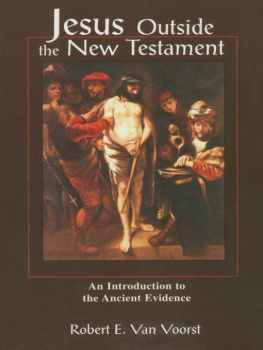
THE JEWISH ANNOTATED NEW TESTAMENT
New Revised Standard Version
THE JEWISH ANNOTATED NEW TESTAMENT
New Revised Standard Version Bible Translation
Amy-Jill Levine and Marc Zvi Brettler
Editors



Oxford University Press, Inc., publishes works that further Oxford Universitys objective of excellence in research, scholarship, and education.
Oxford New York
Auckland Cape Town Dar es Salaam Hong Kong Karachi Kuala Lumpur
Madrid Melbourne Mexico City Nairobi New Delhi Shanghai Taipei Toronto
With offices in
Argentina Austria Brazil Chile Czech Republic France Greece Guatemala
Hungary Italy Japan Poland Portugal Singapore South Korea Switzerland
Thailand Turkey Ukraine Vietnam
Copyright 2011 by Oxford University Press, Inc.
Published by Oxford University Press, Inc.
198 Madison Avenue, New York, New York 10016
http://www.oup.com
Oxford is a registered trademark of Oxford University Press
All rights reserved. No part of this publication may be reproduced, stored in a retrieval system, or transmitted, in any form or by any means, electronic, mechanical, photocopying, recording, or otherwise, without the prior permission of Oxford University Press.
New Revised Standard Version Bible copyright 1989 by the Division of Christian Education of the National Council of the Churches of Christ in the U.S.A.
Up to five hundred (500) verses of the New Revised Standard Version (NRSV) Bible text may be quoted or reprinted without the express written permission of the publisher, provided that the verses quoted neither amount to a complete book of the Bible nor account for 50 % or more of the written text of the total work in which they are quoted. When the NRSV text is quoted, notice of copyright must appear on the title or copyright page of the work as follows:
The Scripture quotations contained herein are from the New Revised Standard Version Bible, copyright 1989 by the Division of Christian Education of the National Council of the Churches of Christ in the U.S.A., and are used by permission. All rights reserved.
When quotations from the NRSV text are used in non-saleable media, such as church bulletins, orders of service, posters, transparencies, or similar media, the initials (NRSV) may be used at the end of each quotation.
Quotations or reprints in excess of five hundred (500) verses (as well as other permission requests) must be approved in writing by the NRSV Permissions Office, The National Council of the Churches of Christ in the U.S.A., 475 Riverside Drive, New York, NY 10115-0050.
Portions of the informational annotations for Luke and 2 Corinthians are based on those in The New Oxford Annotated Bible, fourth edition. Copyright 2010 by Oxford University Press, Inc. Used by permission.
Part of the essay Jewish History, 331 BCE 135 CE is adapted from Introduction to the Apocrypha in The Oxford Bible Commentary. Copyright 2001 by Oxford University Press. Used by permission.
Design and typesetting by 2Krogh AS, Denmark.
10 9 8 7 6 5 4 3 2 1
Printed in the USA
EDITORS AND CONTRIBUTORS
Alan J. Avery-Peck The Second Letter of Paul to the Corinthians
Herbert Basser The Letter of James
Daniel Boyarin Logos, A Jewish Word: Johns Prologue as Midrash
Marc Zvi Brettler, Editor The New Testament between the Hebrew Bible (Tanakh) and Rabbinic Literature
Jonathan Brumberg-Kraus The Third Letter of John
Shaye J. D. Cohen The Letter of Paul to the Galatians; Judaism and Jewishness; Josephus
Michael Cook The Letter of Paul to the Philippians
Pamela Eisenbaum The Letter to the Hebrews
Michael Fagenblat The Concept of Neighbor in Jewish and Christian Ethics
Charlotte Elisheva Fonrobert Judaizers, Jewish Christians, and Others
David Frankfurter The Revelation to John
David M. Freidenreich Food and Table Fellowship
Julie Galambush The Second Letter of John
Aaron M. Gale The Gospel According to Matthew
Joshua D. Garroway Ioudaios
Barbara Geller The Letter of Paul to Philemon
Gary Gilbert The Acts of the Apostles
Martin Goodman Jewish History, 331 BCE135 CE
Leonard Greenspoon The Septuagint
Michael R. Greenwald The Second Letter of Peter; The Canon of the New Testament
Adam Gregerman The Second Letter of Paul to the Thessalonians
Maxine Grossman The Letter of Paul to the Ephesians; The Dead Sea Scrolls
Susannah Heschel Jesus in Modern Jewish Thought
Martha Himmelfarb Afterlife and Resurrection
Tal Ilan The Second Letter of Paul to Timothy
Andrew S. Jacobs The Letter of Jude
Jonathan Klawans The Law
Naomi Koltun-Fromm The First Letter of Paul to Timothy
Jennifer L. Koosed The Letter of Paul to Titus
Ross S. Kraemer Jewish Family Life in the First Century CE
Shira Lander The First Letter of Paul to the Corinthians
Daniel R. Langton Paul in Jewish Thought
Rebecca Lesses Divine Beings
David B. Levenson Messianic Movements
Amy-Jill Levine, Editor The Gospel According to Luke; Bearing False Witness: Common Errors Made about Early Judaism
Lee I. Levine The Synagogue
Martin Lockshin Jesus in Medieval Jewish Tradition
Michele Murray The First Letter of John
Mark D. Nanos The Letter of Paul to the Romans; Paul and Judaism
Adele Reinhartz The Gospel According to John
David Fox Sandmel The First Letter of Paul to the Thessalonians
David Satran Philo of Alexandria
Daniel R. Schwartz Jewish Movements of the New Testament Period
Naomi Seidman Translation of the Bible
Claudia Setzer The First Letter of Peter; Jewish Responses to Believers in Jesus
David Stern Midrash and Parables in the New Testament
Geza Vermes Jewish Miracle Workers in the Late Second Temple Period
Burton L. Visotzky Jesus in Rabbinic Tradition
Lawrence M. Wills The Gospel According to Mark
Peter Zaas The Letter of Paul to the Colossians
CONTENTS
The New Testament Maps, Charts, Sidebar Essays, and Diagrams Essays
INTRODUCTORY ESSAYS
HISTORY AND SOCIETY
LITERATURE
JEWISH RESPONSES TO THE NEW TESTAMENT
Tables, Glossary, Index
THE EDITORS PREFACE
for my family, my kin of the flesh: Israelites they are, and to them are due the sonship, the glory, the covenants, the giving of Torah, the worship, the promises; of them were the patriarchs, and from them is the messiah in the fleshwho is over all, and whom God blessed, forever for the gifts and the calling of God are irrevocable. Saul (Paul) of Tarsus, Letter to the community in Rome, 9.35; 11.29
It is almost two millennia since the earliest texts incorporated into the New Testament were composed. For the most part, these centuries have seen a painful relationship between Jews and Christians. Although Jewish perceptions of Christians and Christian perceptions of Jews have improved markedly in recent decades, Jews and Christians still misunderstand many of each others texts and traditions. The landmark publication of this book is a witness to that improvement; ideally, it will serve to increase our knowledge of both our common histories and the reasons why we came to separate.
The word Jewish in the title The Jewish Annotated New Testament serves several roles. First, this volume highlights in its annotations and essays aspects of first- and second-century Judaism that enrich the understanding of the New Testament: customs, literature, and interpretations of biblical texts. We believe that it is important for both Jews and non-Jews to understand how close, in many aspects, significant parts of the New Testament are to the Jewish practices and beliefs reflected in the works of the Dead Sea Scrolls, Philo and Josephus, the Pseudepigrapha and Deuterocanonical literature, the Targumim (Aramaic translations of the Bible), and slightly later rabbinic literature, and that the New Testament has, in many passages, Jewish origins. Jesus was a Jew, as was Paul; likely the authors known as Matthew and John were Jews, as were the authors of the Epistle of James and the book of Revelation. When they were writing, the parting of the ways had not yet occurred. Other authors, such as the individual who composed the Gospel of Luke and the Acts of the Apostles, while probably not Jewish themselves, were profoundly influenced by first- and second-century Jewish thought and by the Jewish translation of Tanakh into Greek, the Septuagint. Thus, understanding the diverse Jewish populations of the early Roman Empiretheir habits, their conventions, their religious practicesis as crucial to understanding the New Testament writings as is general familiarity with the Roman world. In turn, familiarity with the New Testament helps Jews to recover some of our own history.
Next page
